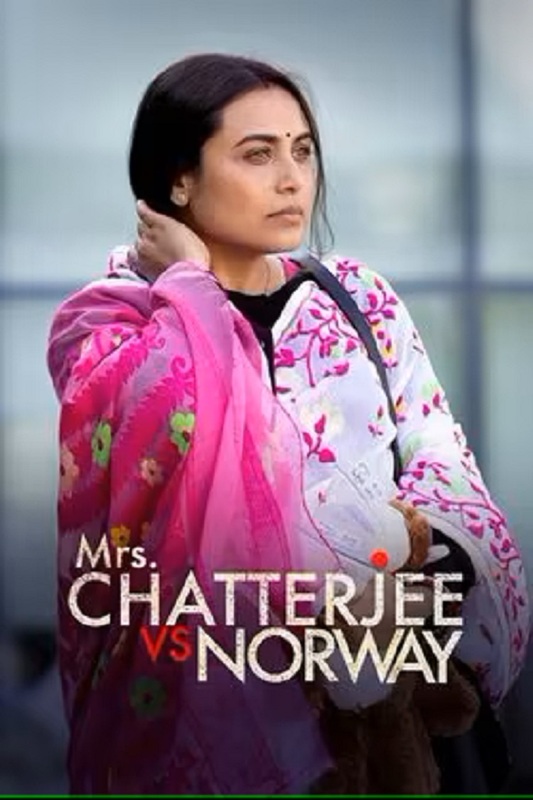The story of Debika Chatterjee, a single mother fighting to reunite with her children in Norway, resonated with millions worldwide. The legal battle in “Mrs. Chatterjee vs Norway” captured hearts and ignited discussions on cultural differences, parental rights, and the complexities of international adoption. It’s a story of a mother’s unyielding love and her fight for what she believed was right, a story that transcended borders and languages.

Image: www.blu-ray.com
Beyond the captivating courtroom drama and the emotional rollercoaster of the narrative, the movie serves as a powerful lens through which we can examine the challenges faced by immigrant families, particularly those navigating cultural differences within foreign legal systems. “Mrs. Chatterjee vs Norway” isn’t just entertainment; it’s a poignant portrayal of individual struggles within a larger socio-political context.
Understanding the Movie’s Narrative
The film beautifully captures the essence of Debika’s journey. From the initial joy of settling in Norway with her children to her world crumbling as she loses custody after a series of events deemed “neglect” by the Norwegian authorities, the movie unfolds with gripping intensity. Debika’s battle becomes a symbol of the struggle for cultural understanding and the right of parents to raise their children according to their cultural values within a different legal framework.
The film delves into the complexities of the Norwegian child welfare system, raising questions about its effectiveness and its potential for cultural bias in certain situations. While the system aims to protect children’s well-being, instances like Debika’s case challenge the universality of certain parenting practices and highlight the need for cultural sensitivity within legal frameworks.
The Movie’s Impact and Global Resonance
The movie’s release sparked a wave of discussions across the globe, with people questioning the actions of the Norwegian authorities. Many resonated with Debika’s plight as a parent fighting for her children. While some criticized the Norwegian system, others highlighted the importance of child protection and the need for a nuanced understanding of cultural differences in such cases.
The movie ignited debates on the delicate balance between child welfare and parental rights. It brought to the forefront the challenges faced by immigrant families adapting to new cultures and legal systems, often leaving them feeling vulnerable and isolated. The movie’s success lies not only in its narrative power but also its ability to provoke conversations, encouraging empathy and understanding across cultural boundaries.
Key Takeaways from “Mrs. Chatterjee vs Norway”
The movie serves as a poignant reminder of the importance of cultural sensitivity and respect in navigating child welfare issues. Although the Norwegian system aims to protect children, it’s crucial to consider cultural nuances and avoid imposing interpretations that might be culturally insensitive.
The film also highlights the power of a mother’s love. Despite facing immense obstacles, Debika’s unwavering determination to reunite with her children is a testament to the depths of parental love. Her resilience and unwavering belief in her own parenting abilities inspire viewers to fight for what they believe in, regardless of the challenges they face.

Image: www.youtube.com
Tips for Navigating Cultural Differences in Parenting
The film’s central theme emphasizes the importance of communication and understanding in navigating cultural differences in parenting. If you find yourself in a situation where cultural differences are a factor, here are some tips to foster better communication and understanding:
- Be open to learning and understanding different perspectives: Be willing to step outside your cultural norms and embrace the possibility that other approaches to parenting are valid.
- Engage in respectful dialogue: Avoid judgments and try to see things from the other person’s point of view.
- Seek advice from cultural mediators: If conflicts arise, cultural mediators can help bridge communication gaps and provide insights into different cultural viewpoints.
Remember, cultural differences are not a barrier to meaningful connection. By practicing empathy, respecting different viewpoints, and fostering open communication, we can navigate these differences with sensitivity and create stronger relationships.
FAQs about Mrs. Chatterjee vs Norway
Q: Is the movie based on a true story?
Yes, the movie is inspired by the real-life story of Debika Chatterjee. While the movie takes creative liberties, it draws inspiration from Debika’s experiences and legal battles in Norway.
Q: What are the main themes explored in the movie?
The movie delves into themes of cultural differences, parental rights, child welfare, and the resilience of the human spirit amidst adversity.
Q: What message does the movie convey?
The movie emphasizes the importance of cultural sensitivity, empathy, and understanding in navigating challenges related to different parenting practices and legal systems. It also underscores the power of a mother’s love and her unwavering determination to protect her children.
Mrs Chatterjee Vs Norway Full Movie
Conclusion: A Journey of Strength and Cultural Awareness
The movie “Mrs. Chatterjee vs Norway” leaves a lasting impact, reminding us that navigating cultural differences in cross-border families can be challenging, but with empathy, respect, and open communication, we can bridge these divides. Debika’s story is a testament to the strength of a mother’s love and the importance of standing up for what you believe in, even when facing insurmountable odds.
Are you interested in learning more about the movie’s impact on the global conversation around cultural sensitivity and understanding in parenting? Share your thoughts and insights in the comments below!





